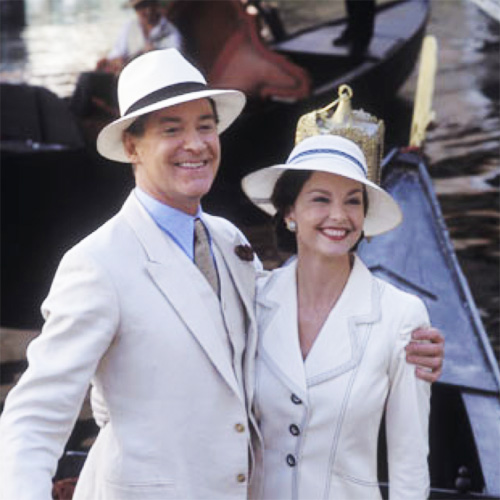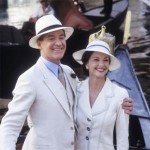
Toss the popcorn into the microwave and cuddle up for some reel LGBT romance.
by Nancy Ford

Ah, February—the month of love. But there are a full 28 days (wait, this year, there’s 29! Leap year! Bonus!) to celebrate the big ball of mush that St. Valentine simply got rolling. Grab the ones you love, slather on some Chapstick, and get ready to pucker!
De-Lovely
Arguably the most celebrated popular composer of the early 20th century, Cole Porter, a semi-closeted homosexual, was as tormented as he was talented. Nonetheless, Porter’s (Kevin Kline) long-suffering wife, Linda (Ashley Judd, who visits Houston April 26 for the Council on Alcohol and Drugs’ 29th Annual Spring Luncheon), loves him despite his unrelenting peccadilloes, and takes that ‘til-death-do-us-part’ business very seriously. This flashback fantasy/biopic plucks a passel of his top hits, like “Just One of Those Things,” “Love for Sale,” “You’re the Top,” “Let’s Misbehave,” and more staples of the Great American Songbook, performed by contemporary artists including Natalie Cole, Elvis Costello, Sheryl Crow, Diana Krall, Alanis Morissette, and others. 2004. Irwin Winkler (producer of Goodfellas, The Right Stuff, Raging Bull, and other four-star films) produces and directs.
Gayest moment: Pick a song, any song. Knowing what we know now, nearly all of Porter’s lyrics (in fact, merely the titles) emit a gaydar-busting clang. Also, the composer likely would have loved the fact that a fellow named Jay Cocks wrote the screenplay.
Frida
The cross-dressing, uni-browed Mexican artist and anarchist Frida Kahlo (Salma Hayek) is remembered almost as much for her emotionally and physically painful life as she is for the horrifically beautiful oils. This film begs the question: would Kahlo have been as prolific and enduring without all that pain? Or is that the purest essence of art itself? How Frida could subsequently wish to return to the corpulent, unfaithful artist/husband Diego Rivera after languishing in the lithe arms of Tina Modotti (again, Ashley Judd) is the real question. 2002. Julie Taymor directs.
Gayest moment: Tina Modotti, delivering a wedding toast: “I don’t believe in marriage. [Crowd laughs] No, I really don’t. Let me be clear about that. I think at worst it’s a hostile political act, a way for small-minded men to keep women in the house and out of the way, wrapped up in the guise of tradition and conservative religious nonsense. At best, it’s a happy delusion—these two people who truly love each other and have no idea how truly miserable they’re about to make each other. But, but, when two people know that, and they decide with eyes wide open to face each other and get married anyway, then I don’t think it’s conservative or delusional. I think it’s radical and courageous and very romantic. To Diego and Frida.”
The Incredibles
Human themes of love, commitment, family, trust, and redemption ring true throughout this spectacular, fast-paced animated film. Bob and Helen Parr (voiced by Craig T. Nelson and Holly Hunter) are a family of superheroes in the “retired superheroes” relocation program trying in vain to fit into a normal, non-heroic lifestyle. But when a young wanna-be superhero goes renegade, the Parr family (get it?) must rise above their jealousies and suspicions, pull on their big-boy-and-girl supertights, be true to who they really are, and save the world. Just like real life. 2004. Brad Bird directs.
Gayest moment: Helen to her son Dash: Right now, honey, the world just wants us to fit in, and to fit in, we gotta be like everyone else.
Dash (Spencer Fox): But Dad always said our powers were nothing to be ashamed of, our powers made us special.
Helen: Everyone’s special, Dash.
Dash (muttering): Which is another way of saying no one is.
The Simpsons Movie
In their long-awaited first feature-length film, our favorite animated family dances the brink of dual disasters: one would destroy their family’s hometown, the other would destroy their family itself. Along the way to its inevitable happy ending, and containing scenes far darker than what we’re used to on Sunday nights, the film addresses such weighty topics as global warming, religious extremism, Big Brother and unwarranted wire-tapping, America’s heritage of polygenesis, the lessons of Hurricane Katrina, and even what may make a person gay—all without even so much as a hint of self-righteousness. Oh, and, of course, Homer saves his family. To me, that smells like love. 2007. David Silverman directs.
Gayest moment: Homer Simpson (as his dogsled team leaves him stranded): Why does everything I whip leave me?
When Night Is Falling
So delightfully French (well okay, French Canadian), this multi-film-fest winner caught the eye of censors in its theatrical release for its then-racy image of two nude women tastefully reclining in velvet. “Tastefully” means none of their naughty bits were displayed. Camille (Pascale Bussières) is engaged to the rigid professor Martin (Henry Czerny), but when the Soleil-esque circus comes to her sleepy, gray college town, along with the smoldering and aptly named Petra Soft (Rachael Crawford), Camille is compelled to run away from the safe but suffocating existence. 1995. Patricia Rozema directs.
Gayest moment: The throbbingly sensuous love scene between the two women, delicately interwoven with the equally erotic trapeze performance. No words necessary.










